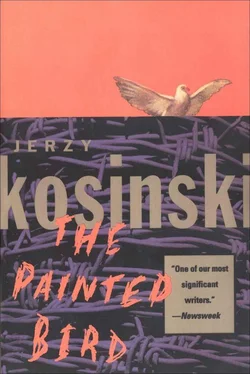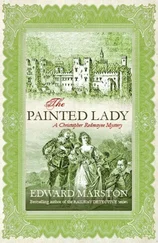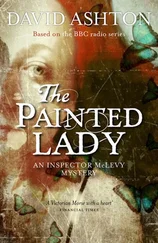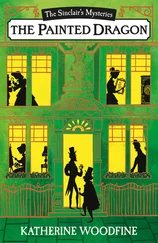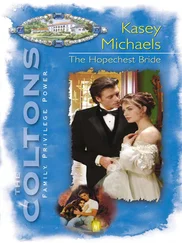Jerzy Kosiński - The Painted Bird
Здесь есть возможность читать онлайн «Jerzy Kosiński - The Painted Bird» весь текст электронной книги совершенно бесплатно (целиком полную версию без сокращений). В некоторых случаях можно слушать аудио, скачать через торрент в формате fb2 и присутствует краткое содержание. Год выпуска: 1965, ISBN: 1965, Жанр: Детская проза, на английском языке. Описание произведения, (предисловие) а так же отзывы посетителей доступны на портале библиотеки ЛибКат.
- Название:The Painted Bird
- Автор:
- Жанр:
- Год:1965
- ISBN:978-0-8021-9575-3
- Рейтинг книги:4 / 5. Голосов: 1
-
Избранное:Добавить в избранное
- Отзывы:
-
Ваша оценка:
- 80
- 1
- 2
- 3
- 4
- 5
The Painted Bird: краткое содержание, описание и аннотация
Предлагаем к чтению аннотацию, описание, краткое содержание или предисловие (зависит от того, что написал сам автор книги «The Painted Bird»). Если вы не нашли необходимую информацию о книге — напишите в комментариях, мы постараемся отыскать её.
The Painted Bird — читать онлайн бесплатно полную книгу (весь текст) целиком
Ниже представлен текст книги, разбитый по страницам. Система сохранения места последней прочитанной страницы, позволяет с удобством читать онлайн бесплатно книгу «The Painted Bird», без необходимости каждый раз заново искать на чём Вы остановились. Поставьте закладку, и сможете в любой момент перейти на страницу, на которой закончили чтение.
Интервал:
Закладка:
In the brightening light of dawn, a crowd of aged women waited in front of the church. Their feet and bodies were swathed in strips of cloth and wraps of odd sorts, and they babbled endless words of prayer while their cold-benumbed fingers shifted the rosary beads. When they saw the priest coming they rose unsteadily, teetering on their knotty canes, and rapidly shuffled to meet him, contesting for priority in kissing his greasy sleeve. I stood aside, trying to remain unnoticed. But those with the best sight stared at me with disgust, called me a vampire or Gypsy foundling, and spat three times in my direction.
The church always overwhelmed me. And yet it was one of the many houses of God scattered all over the world. God did not live in any of them, but it was assumed for some reason that He was present in all of them at once. He was like the unexpected guest for whom the wealthier farmers always kept an additional place at their table.
The priest noticed me and patted my hair warmly. I grew confused as I answered his questions, assuring him that I was now obedient and that the farmer did not have to beat me any more. The priest asked me about my parents, about our prewar home, and about the church which we had attended but which I could not remember very well. Realizing my total ignorance of religion and church observances, he took me to the organist and asked him to explain the meaning of liturgical objects, and to start preparing me for service as an altar boy at morning Mass and vespers.
I began coming to church twice a week. I waited at the back until the old women had crawled to their pews and then I took a back seat, close to the holy water font, which mystified me tremendously. This water looked like any other water. It had no color, no odor; it looked far less impressive than, for example, ground horse bones. Yet its magic power was supposed to far exceed that of any herb, incantation, or mixture that I had ever seen.
I understood neither the meaning of the Mass nor the role of the priest at the altar. All of this to me was magic, more splendid and elaborate than Olga’s witchcraft, but just as difficult to fathom. I looked with wonder at the stone structure of the altar, the finery of the cloths hanging from it, the majestic tabernacle in which the divine spirit dwelled. With awe I touched the fancifully shaped objects stored in the sacristy: the chalice with the shining, polished interior where wine changed into blood, the gilded paten on which the priest dispensed the Holy Ghost, the square, flat burse in which the corporal was kept. This burse opened at one side and resembled a harmonica. How poor Olga’s hut was by comparison, full of its evil-smelling frogs, rotting pus from human wounds, and cockroaches.
When the priest was away from the church and the organist was busy with the organ in the balcony, I would stealthily enter the mysterious sacristy to admire the humeral veil which the priest used to slip over his head and with a nimble movement slide down his arms and loop around his neck. I would stroke my fingers voluptuously along the alb placed over the humeral, smoothing out the fringes of the alb belt, smelling the ever-fragrant maniple which the priest wore suspended from his left arm, admiring the precisely measured length of the stole, the infinitely beautiful patterns of the chasubles, whose varied colors, as the priest explained to me, symbolized blood, fire, hope, penance, and mourning.
While mumbling her magic incantations, Olga’s face had always taken on changing expressions that aroused fright or respect. She rolled her eyes, shook her head rhythmically, and made elaborate movements with her arms and palms. In contrast, the priest, while saying the Mass, remained the same as in everyday life. He merely wore a different robe and spoke a different language.
His vibrant, sonorous voice seemed to buttress the dome of the church, even awakening the sluggish old women sitting in the tall pews. They would suddenly gather their drooping arms and with difficulty raise their wrinkled eyelids, resembling shriveled, heavy, late-cut peapods. The bleak pupils of their dimmed eyes would glance fearfully around, uncertain of where they were, until, finally beginning anew their rumination of the words from an interrupted prayer, they rocked back to sleep like wilted heather swayed by the wind.
The Mass was ending, the old women thronged the aisles, jockeying to reach the priest’s sleeve. The organ fell silent. At the door the organist greeted the priest warmly and gave me a sign with his hand. I had to return to work, to sweep the rooms, feed the cattle, prepare the meal.
Every time I came back from the pasture, the henhouse, or the stable, Garbos would take me into the house and practice, at first casually and then more eagerly, new ways of flogging me with a willow cane, or hurting me with his fists and fingers. My welts and cuts, having no chance to heal, turned into open sores, seeping yellow pus. At night I was so terrified of Judas that I could not sleep. Every slight noise, every creaking of the floorboards, would jolt me into attention. I stared into the impenetrable darkness, pressing my body into the corner of the room. My ears seemed to grow to the size of half-pumpkins, straining to catch any movement in the house or yard.
Even when I finally dozed off my sleep was disturbed by dreams of dogs howling through the countryside. I saw them lifting their heads to the moon, sniffing in the night, and I sensed my approaching death. Hearing their calls, Judas would sneak up to my bed and when he was quite close he would jump on me at Garbos’s command and maul me. The touch of his nails would make rising blisters on my body and the local man-of-cures would have to burn them out with a red-hot poker.
I would wake up screaming and Judas would start barking and jumping at the walls of the house. Garbos, half awake, would rush into the kitchen thinking thieves had broken into the farm. When he realized that I had yelled for no reason, he beat and kicked me until he was out of breath. I remained on the mat, bloody and bruised, afraid to fall asleep again and risk another nightmare.
In the daytime I went around in a daze and was beaten for neglecting my work. Sometimes I would fall asleep on the hay in the barn while Garbos looked for me everywhere. When he found me idling, it started all over again.
I came to the conclusion that Garbos’s seemingly unmotivated fits of rage must have some mysterious cause. I recalled the magic incantations of Marta and Olga. They were meant to influence diseases and such things that had no obvious connection with the magic itself. I decided to observe all the circumstances accompanying Garbos’s attacks of fury. Once or twice I thought I had detected a clue. On two consecutive occasions I was beaten immediately after scratching my head. Who knows, perhaps there was some connection between the lice on my head, which were undoubtedly disturbed in their normal routine by my searching fingers, and Garbos’s behavior. I immediately stopped scratching, even though the itching was unbearable. After two days of leaving the lice alone I was beaten again. I had to speculate anew.
My next guess was that the gate in the fence leading to the clover field had something to do with it. Three times after I went through that gate Garbos called me to him and slapped me when I approached him. I concluded that some hostile spirit was crossing my path at the gate and inciting Garbos against me. I decided to avoid the evil one at the gate by scrambling over the fence. This hardly improved matters. Garbos could not understand why I took time to climb over a high fence instead of taking the short route through the gate. He thought I was mocking him on purpose and I got an even worse beating.
He suspected me of malice and tormented me ceaselessly. He amused himself by jabbing a hoe handle between my ribs. He threw me into beds of nettles and thorny bushes, and afterwards laughed at the way I scratched the stings on my skin. He threatened that if I continued to be disobedient he would hold a mouse on my belly as husbands did to unfaithful wives. This terrified me more than anything else. I visualized a mouse under a glass cup on top of my belly button. I could feel the indescribable agony as the trapped rodent gnawed its way through my navel and into my entrails.
Читать дальшеИнтервал:
Закладка:
Похожие книги на «The Painted Bird»
Представляем Вашему вниманию похожие книги на «The Painted Bird» списком для выбора. Мы отобрали схожую по названию и смыслу литературу в надежде предоставить читателям больше вариантов отыскать новые, интересные, ещё непрочитанные произведения.
Обсуждение, отзывы о книге «The Painted Bird» и просто собственные мнения читателей. Оставьте ваши комментарии, напишите, что Вы думаете о произведении, его смысле или главных героях. Укажите что конкретно понравилось, а что нет, и почему Вы так считаете.
